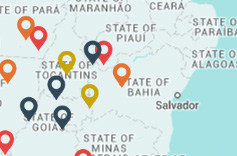Balata and Rubber Workers Association – Monte Alegre (Pará)
The rubber tapper’s pain: territory, work, and memory in the field
Pará
Objectives and target population:
The project aims for the recognition and realization of the socio-environmental rights of rubber tappers in Monte Alegre (PA), in both their traditional work and cultural expression. Balatas are trees which produce a substance similar to latex, used in the production of a type of rubber.
Main activities:
– Create a social map of the balata forests;
– Produce informative material in support of the struggle for territorial access, in order to guarantee the continuity of their traditional practices and society;
– Research into sources and material evidence to provide a basis for requesting legal benefits to which the balata tappers are entitled;
– Produce an ethnographic documentary to spread and promote the memory of rubber tappers’ work and territory in the region.
Context:
As the title phrase from one extractivist worker suggests, “the rubber tapper’s pain is the same pain as a forgotten woman’s.” The project focuses on the social and legal neglect and invisibility of a group that, between 1930 and 1970, was responsible for one of Pará’s main exports. At the time, nearly 400 tons of balata were sold to Europe and the United States per year, and the workers comprised a veritable army.
Recruited by local “bosses,” with international connections, they lived in a network of human and natural resource exploitation, under a rigid hierarchy and system of debt slavery. The upper-river projects imposed harvesting expeditions of, on average, six months of grueling conditions. It is unknown how many died, but many returned sick, injured or mutilated.
When the balata economy collapsed in the 1980s, those who survived dedicated themselves to subsistence agriculture, fishing, mining and nut harvesting. Many got sick, became alcoholics, and, elderly, were forgotten by the economy and Brazilian social security.
Some are still healthy enough to live as craftsmen and women, working with balata (a traditional practice in Belém), but still face restrictions on access to the balata forests, which have become environmental conservation areas.
About the association:
Since 2005, the association has worked in partnership with public institutions and non-governmental organizations on projects supporting small-scale extraction and maintenance of regional supply chains, in an effort to improve living conditions for extractivists and protect their rights. In the struggle for free access to their occupational territories, it participates in research expeditions and forest inventories and monitors concessions of these forests in the conservation areas of the region.
In 2010, the group organized a public event with the Pará Public Defender’s Office to request clarification and the forwarding and accompaniment of social pension requests for former balata extractors. Since 2005, it has participated in projects to defend the cultural rights of the local populations and their registry and expression of cultural memories and patrimony.
Partnerships:
The organization maintains a partnership with the Federal University of Western Pará (UFOPA); the Monte Alegre Forest Association; the Association of Artisans of Praça da Republica (Belém, PA); and the National Center of Folklore and Popular Culture (Iphan).
In this project supported by the Fund, the partnerships with UFOPA and the Forest Association will guarantee technical and anthropological coordination, the availability of researchers and equipment and logical support for their activities.
Funding Line
Annual Call for Proposals
Year
-
Total Granted
-
Duration
-
Main Themes
Right to Land






